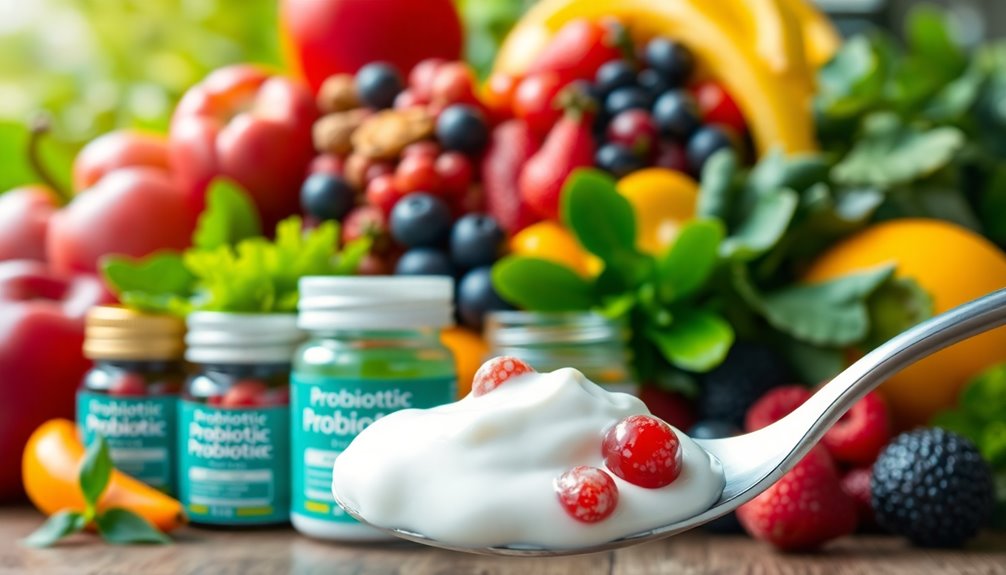Probiotics are incredible for your health, offering numerous benefits that can transform how you feel. They support digestive health by promoting a balanced gut microbiome, making digestion smoother and nutrient absorption more effective. Your immune function gets a boost too, as probiotics help regulate inflammation and fend off harmful pathogens. You might even notice improvements in your mood and cognitive function, as certain strains can reduce anxiety and enhance emotional resilience. Plus, they can aid in weight management and improve your skin health. There's so much more to explore about their advantages, so let's keep going!
Key Takeaways
- Probiotics promote a balanced gut microbiome, enhancing digestion, nutrient absorption, and alleviating IBS symptoms.
- They strengthen immune function by regulating inflammation and protecting against pathogens.
- Probiotics support mental well-being by improving mood and cognitive function while reducing anxiety symptoms.
- They aid in weight management by regulating metabolism, enhancing fat storage, and reducing appetite.
- Probiotics improve skin health by balancing skin bacteria, reducing inflammation, and promoting healing.
Supports Digestive Health

Probiotics play a vital role in supporting digestive health by promoting a balanced gut microbiome. You mightn't realize it, but the gut bacteria in your digestive system greatly impact how well you digest food and absorb nutrients. An imbalance in these microorganisms can lead to discomfort, bloating, and other gastrointestinal issues. Luckily, incorporating probiotic supplements into your routine can help restore that balance.
When you take probiotic supplements, you're introducing beneficial bacteria that can enhance your gut flora. These friendly microbes compete with harmful bacteria, making it harder for them to thrive. This competition is important for maintaining a healthy digestive environment.
Research has shown that certain strains of probiotics can alleviate symptoms of irritable bowel syndrome (IBS), reduce the severity of diarrhea, and even support regular bowel movements. Additionally, maintaining a healthy gut can contribute to overall wellness, including supporting healthy nerves and reducing pain.
You may find it comforting to know that you're not alone in this journey toward better digestive health. Many people are turning to probiotics for support. They come in various forms, including capsules, powders, and fermented foods, making it easier for you to find a method that fits your lifestyle.
As you consider integrating probiotics into your daily routine, remember the significance of consistency. Over time, you'll likely notice improvements in your digestion and overall well-being. It's about creating a supportive environment for your gut bacteria, and with the right probiotics, you're taking a positive step toward a healthier you.
Enhances Immune Function

When it comes to boosting your immune function, incorporating probiotics into your routine can make a significant difference. Research shows that these beneficial bacteria not only support gut health but also play an essential role in enhancing your immune response. A balanced gut microbiome helps regulate inflammation and protects against pathogens, which means you're less likely to fall ill.
Here's a quick look at how probiotics can improve your immune function:
| Benefit | Explanation |
|---|---|
| Strengthens Gut Barrier | Probiotics help maintain the integrity of your gut lining. |
| Supports Immune Cells | They stimulate the production of antibodies and enhance T-cell function. |
| Reduces Allergic Reactions | Probiotics can help mitigate symptoms related to allergies. |
| Influences Gut Brain Connection | A healthy gut microbiome can impact your brain health and overall well-being. |
| Balances Inflammation | They help control inflammation levels, which is essential for immune health. |
By fostering the gut-brain connection, probiotics can also influence your body's response to stress, which is crucial for maintaining a robust immune system. Plus, if you struggle with allergies, studies suggest that probiotics can help reduce these reactions, making life a bit more manageable. Drinking water from SlimCrystal bottles may further enhance your overall health and vitality, complementing the benefits of probiotics.
Incorporating probiotics into your diet can be as simple as enjoying yogurt, kefir, or fermented foods. Just a small change can lead to a healthier, more resilient you. Embrace the power of probiotics and support your immune function today!
Promotes Mental Well-Being

Mental well-being is increasingly recognized as an essential component of overall health, and recent research suggests that probiotics can play a pivotal role in enhancing it. You might be surprised to learn that the gut-brain connection is stronger than most people realize. The beneficial bacteria in your gut can influence not just physical health but also your emotional and mental states.
Here's how probiotics can promote mental well-being:
- Cognitive function: Studies show that a healthy gut microbiome can improve memory and overall cognitive performance. When you nourish your gut, you may find it easier to concentrate and think clearly.
- Mood regulation: Probiotics have been linked to the production of neurotransmitters like serotonin, which is vital for mood stability. By maintaining a balanced gut flora, you could experience fewer mood swings and greater emotional resilience.
- Stress reduction: Certain probiotic strains may help lower cortisol levels, the hormone associated with stress. When your body manages stress better, you can face challenges with a clearer mindset.
- Anxiety relief: Research indicates that some probiotics may reduce symptoms of anxiety and depression. Incorporating these beneficial bacteria into your diet could lead to a more positive outlook on life.
Additionally, utilizing techniques like Brainwave Guidance technology may complement the effects of probiotics by promoting emotional healing and enhancing mental clarity.
Embracing probiotics isn't just about physical health; it's about nurturing your mind too. By prioritizing your gut health, you're investing in your mental well-being, creating a path towards a happier, more balanced life.
Aids in Weight Management

Struggling with weight management can feel like an uphill battle, but incorporating probiotics into your routine might just tip the scales in your favor. Research suggests that the balance of gut bacteria plays an essential role in weight loss. By fostering a healthy gut microbiome, probiotics can help regulate your metabolism and influence how your body stores fat.
When you introduce probiotics into your diet, you're not just adding beneficial bacteria; you're also promoting a more diverse gut environment. This diversity is linked to better weight management outcomes. Studies show that individuals with a higher variety of gut bacteria tend to have lower body mass indexes (BMIs).
Here's a quick look at some ways probiotics can aid in weight management:
| Probiotic Benefits | Description |
|---|---|
| Enhances Metabolism | Probiotics can boost metabolic rates, helping you burn calories more effectively. |
| Reduces Appetite | Certain strains may help you feel fuller, reducing cravings and overall food intake. |
| Balances Gut Health | A healthy gut microbiome supports proper digestion, which is essential for weight loss. |
Additionally, increased oxygen intake can further enhance your body's ability to burn fat and maintain a healthy weight.
Improves Skin Health

Probiotics offer more than just digestive benefits; they can greatly enhance your skin health, too. By incorporating probiotics into your routine, you can address various skin concerns effectively. Research shows that a healthy gut microbiome influences skin appearance, leading to a radiant complexion.
Here are four key ways probiotics improve your skin health:
- Acne Prevention: Probiotics help balance your skin's natural bacteria, reducing the growth of acne-causing organisms. This balance can result in fewer breakouts and clearer skin.
- Anti-Aging: As you age, your skin's resilience decreases. Probiotics support skin elasticity and hydration, combating the signs of aging and helping you maintain a youthful glow.
- Eczema Relief: If you struggle with eczema, you're not alone. Probiotics have been shown to alleviate symptoms by strengthening the skin barrier, which can reduce irritation and promote healing.
- Skin Hydration: Keeping your skin hydrated is crucial for overall health. Probiotics promote moisture retention in the skin, helping to prevent dryness and flakiness. Additionally, a diet low in high-carb bread can further improve gut health, which is closely linked to skin conditions.
Reduces Inflammation

Numerous studies highlight how probiotics can greatly reduce inflammation in the body. This is particularly significant as chronic inflammation is linked to various health issues, from digestive disorders to mental health problems. By incorporating probiotics into your diet, you might find a natural way to manage inflammation effectively.
Probiotics work by supporting the gut-brain connection, which plays an essential role in how your body responds to inflammation. Certain probiotic strains have been shown to release anti-inflammatory compounds that can alleviate symptoms and promote overall well-being. Below is a table summarizing key probiotic strains and their effects on inflammation:
| Probiotic Strain | Inflammation Reduction Effect | Additional Benefits |
|---|---|---|
| Lactobacillus rhamnosus | Reduces gut inflammation | Supports immune function |
| Bifidobacterium lactis | Decreases systemic inflammation | Enhances digestive health |
| Saccharomyces boulardii | Lowers intestinal inflammation | Promotes gut barrier function |
Incorporating these strains into your routine, whether through supplements or fermented foods, can pave the way for a healthier you. It's not just about gut health; it's about feeling good in your body and mind. Connecting with others who prioritize probiotics can also foster a sense of belonging and community. Remember, reducing inflammation isn't just a personal journey; it's a collective effort toward better health for everyone. Additionally, maintaining a healthy balance of gut bacteria is crucial for preventing chronic kidney disease and promoting overall well-being.
Balances Gut Microbiome

Maintaining a balanced gut microbiome is essential for overall health, and probiotics play a significant role in achieving this balance. When you incorporate probiotics into your diet, you're actively supporting the microbial diversity that's vital for a thriving gut environment. A diverse microbiome not only aids digestion but also interacts with the gut-brain axis, influencing your mental health and emotional well-being. Research has shown that disruptions in gut health can lead to serious health risks, similar to the health risks associated with snoring and sleep apnea.
Here are some key benefits of probiotics in balancing your gut microbiome:
- Enhances Microbial Diversity: Probiotics introduce beneficial bacteria that can help replenish and diversify your gut flora, creating a more resilient microbiome.
- Supports Digestive Health: A balanced microbiome can improve digestion, reduce bloating, and prevent gastrointestinal issues, allowing you to feel your best.
- Boosts Immune Function: Probiotics play an essential role in maintaining the integrity of your gut barrier, which helps prevent infections and supports overall immune health.
- Affects the Gut-Brain Axis: The connection between your gut and brain is profound; probiotics may help regulate mood and stress levels by promoting a healthy gut microbiome.
May Lower Cholesterol Levels

While you might primarily think of probiotics as a way to enhance gut health, they also have the potential to lower cholesterol levels. Research shows that certain strains of gut bacteria can positively influence your cholesterol profile, making probiotics an appealing alternative for those looking to manage their heart health.
When you take probiotic supplements, you're not just boosting your digestive function; you may also be helping your body reduce levels of LDL cholesterol, often referred to as "bad" cholesterol. Studies indicate that specific strains of probiotics, like Lactobacillus and Bifidobacterium, can help break down bile acids in the intestines. This process can lead to a decrease in cholesterol absorption, ultimately resulting in lower cholesterol levels in your bloodstream. Additionally, studies suggest that oxidized cholesterol can significantly contribute to plaque buildup, which further emphasizes the importance of managing cholesterol levels for heart health.
Incorporating probiotics into your routine can be straightforward. You can choose from a variety of probiotic supplements available on the market, or you might opt for fermented foods like yogurt, kefir, and sauerkraut. Both options can foster a healthy balance of gut bacteria, which is essential for overall wellness.
If you're feeling overwhelmed by dietary changes, remember that small, consistent steps can lead to significant improvements. By focusing on enhancing your gut health through probiotics, you may find that you're also supporting your cholesterol management efforts.
Supports Heart Health

Probiotics don't just play a role in managing cholesterol; they also support heart health in various ways. By incorporating probiotics into your diet, you can enjoy several cardiovascular benefits that contribute to overall well-being. Here are some key ways probiotics can positively impact your heart health:
- Cholesterol Reduction: Probiotics help lower LDL cholesterol levels, which can decrease your risk of heart disease.
- Blood Pressure Regulation: Research shows that probiotics can assist in regulating blood pressure, making them a valuable ally for those concerned about hypertension.
- Anti-Inflammatory Effects: Probiotics may diminish inflammation in the body, a significant factor in cardiovascular health.
- Improved Gut Health: A healthy gut microbiome can improve nutrient absorption and support the production of beneficial compounds that contribute to heart health.
When you think about probiotics and blood pressure, it's important to know that specific strains, like Lactobacillus and Bifidobacterium, have shown promise in clinical studies. These probiotics can help maintain healthy blood pressure levels, which is vital for preventing heart-related issues. Additionally, addressing inflammation through natural remedies can further enhance cardiovascular health.
Including probiotic-rich foods, such as yogurt, kefir, and fermented vegetables, in your diet can be an enjoyable and effective way to support your heart health. Remember, you're not alone on this journey to better health. By making these small changes, you're taking significant steps toward a healthier heart and overall wellness. Embrace the power of probiotics and feel the benefits!
Frequently Asked Questions
How Do I Choose the Right Probiotic Supplement?
Choosing the right probiotic supplement can feel overwhelming, but you can simplify it. Start by comparing brands; look for those with transparent labeling and positive reviews.
Pay attention to the specific probiotic strains each product contains, as different strains serve various purposes. It's crucial to select one that aligns with your health goals.
Don't hesitate to consult a healthcare professional for personalized advice, ensuring you find the right fit for your needs.
Are There Any Side Effects of Taking Probiotics?
Probiotics can bring potential pitfalls. While most people tolerate them well, some might experience mild side effects like bloating or gas, especially with high probiotic dosages. It's important to choose the right probiotic strains that suit your body and to watch for any allergies. If side effects persist, consider adjusting your dosage or consulting a healthcare provider. Remember, understanding your body's reactions helps guarantee probiotics' effectiveness and your overall well-being.
Can Probiotics Be Taken With Antibiotics?
Yes, you can take probiotics with antibiotics, but timing matters. Antibiotics can disrupt gut health by killing both bad and good bacteria. Taking probiotics helps replenish those beneficial microbes, supporting your gut health and immunity.
Aim to space them out, taking probiotics a few hours after your antibiotic dose. This way, you maximize the effectiveness of both, ensuring you maintain a balanced gut flora while your body fights off infection.
How Long Does It Take for Probiotics to Work?
Think of probiotics as tiny gardeners tending to your gut. Typically, you'll start noticing their effectiveness within a week or two, but it can take longer depending on the probiotic dosage and your unique body.
Consistency is key, so sticking with them daily can enhance results. Everyone's journey is different, and being patient while your gut flora flourishes is essential for the best outcome.
Are Probiotics Safe for Children and Pregnant Women?
Yes, probiotics can be safe for children and pregnant women. When considering probiotics for infants, it's important to choose strains specifically designed for their needs. Research suggests that probiotics during pregnancy may support maternal and fetal health.
Always consult your healthcare provider before starting any new supplement, especially for your little ones or during pregnancy. You want to make sure the best choices for your family's well-being and health.
Conclusion
Incorporating probiotics into your daily routine can be a game-changer for your health. They're like little superheroes for your gut, boosting digestion, enhancing immunity, and even lifting your mood. By balancing your microbiome and reducing inflammation, probiotics pave the way for better overall wellness. Plus, they can help manage weight and support heart health. So, why not give your body the support it deserves? Embrace the power of probiotics and feel the difference they can make!



